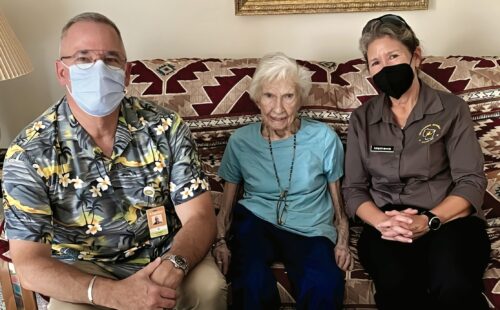People who are very ill often ask spiritual questions, in seeking comfort, meaning and hope. While clergy, chaplains and other spiritual leaders may play an important role in spiritual care, family and friends can offer important spiritual support too.
If you have the opportunity to provide spiritual support for someone living with an illness, here are some suggestions:
Explore your own beliefs and values before you talk to others.
To support others spiritually, it’s important to understand your own spiritual beliefs about illness. Think of a time when you faced a major life transition, change or loss.
- How did it affect you spiritually?
- How did your spirituality affect the experience?
- Did you discover spiritual strength during that time?
- Did you ever question your faith?
- How did you want to be supported spiritually?
If you have not been diagnosed with a serious illness yourself, exploring these questions will help you understand your spirituality when facing life-changing situations.
Even within families, among friends and in faith communities, people’s spiritual beliefs and experiences may be very different. Be clear that your beliefs and values reflect your own beliefs and yours alone. Just as you would want another person to listen to you with respect and understanding, your family member or friend wants you to listen to them with respect and understanding as well.
Understand the kinds of spiritual questions people with a serious illness may ask.
People who are very ill often draw on their spiritual beliefs and experience as a source of strength. However, facing illness may also bring up a wide range of thoughts, feelings and questions. Here are some questions people may ask:
- Who am I now?
- What gives my life meaning?
- What am I thankful for?
- What is my relationship with family and friends?
- How has my illness affected my relationships?
- Is there anything I want to change in my relationships?
- Are there ways I need to ask for forgiveness?
- What do I regret?
- What do I fear?
- What makes me sad about my illness?
- What makes me angry?
- What is my source of strength?
- When do I feel spiritually alive?
- How do I want my family and friends to support me spiritually?
- How do I want my clergy, chaplain or spiritual leader to support me?
- How important is a faith community for me right now?
- Are there sacraments or rituals that are meaningful for me?
- What books, music, prayers, readings, art are meaningful for me?
It is common for people living with serious illness to ask themselves these types of questions. As a “spiritual companion,” you can best support others by helping them explore these questions rather than providing the answers.
Be aware of spiritual pain and suffering.
Spiritual pain and suffering is as real and powerful as physical or emotional pain. There are many spiritual and religious issues people who have a serious illness may face and struggle with including the following:
- Meaning and Purpose: Many people who are very ill question what their life means. They may wonder if they have done anything positive or lasting with their life. Some people ask “Why me?” or “Why now?” or “Why this illness?” The search for meaning and purpose may bring up a wide range of emotions, from anger and loss to relief and peace. Struggling with these questions can be a normal part of dealing with illness.
- Guilt and forgiveness: As people face illness, they may reflect on difficult situations and experiences in the past. They may feel guilty about or blame others for things that have happened.
- Loss of faith: Living with a serious illness can cause people to question their spiritual beliefs or faith. They may explore thoughts and feelings that differ from long-held beliefs. They may become angry with God, their religion, themselves, or with others who think they should believe a certain way.
- Issues with faith tradition or faith community: Faith communities may be able to provide support from clergy or members by offering prayer, visits, sacraments or rituals. While some people find these to be very helpful when they are very ill, others may feel their traditions or community do not provide them with the support they need.
Remember that you are not in this alone.
- As a friend or family member, know your comfort zones and your limits.
- Encourage the involvement of professional clergy, chaplains or other spiritual leaders with expertise in spiritual care when possible.
- Respect the truth that each person deals with spiritual issues in their own time and way. Their timetable may not be your timetable, so be patient with the person you are supporting.
- Remember, by offering spiritual understanding and support for someone who is very ill, you may help that person find the comfort, meaning and hope they seek.






